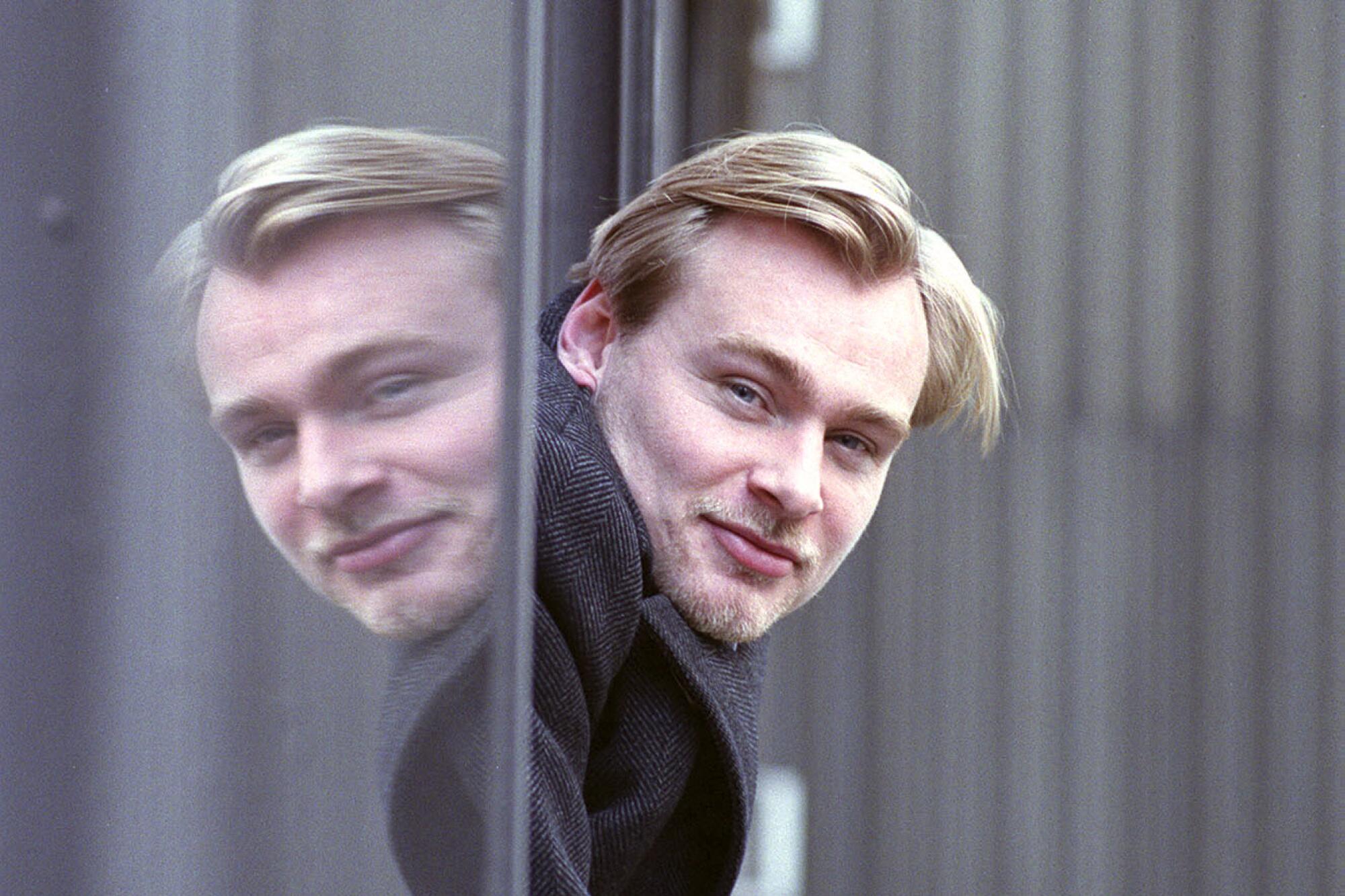
On the Shelf
The Nolan Variations: The Movies, Mysteries, and Marvels of Christopher Nolan
By Tom Shone
Knopf: 400 pages, $40
If you buy books linked on our site, The Times may earn a commission from Bookshop.org, whose fees support independent bookstores.
Whenever a new Christopher Nolan movie comes out, fans immediately start filling up the internet with armchair theorizing, whether unpacking the hidden political messages of “The Dark Knight” or decoding the dreams within dreams of “Inception.” But in writing his new retrospective book on Nolan’s career to date, Tom Shone had a special ace up his sleeve: Nolan himself.
In “The Nolan Variations,” released this week, British film critic Shone draws upon dozens of hours of interviews with the famously secretive director to explore the recurring themes and obsessions that run through Nolan’s work, from his little-seen 1998 feature debut, “Following,” through blockbusters like “Batman Begins” and “Dunkirk” and all the way up to his latest film, “Tenet,” which had its pandemic-straitened release in August.
Sifting for clues in Nolan’s upbringing and his creative influences, Shone attempts to explain how a director whose work is so dense with heady, sometimes challenging ideas ended up bending mainstream Hollywood — and at times our basic notions of reality — to his enigmatic vision.
Shone is happy to report that he only partially succeeded. “My fear was if we sat in a room and talked about the films, I’d come to an understanding of them and then some of the magic would be gone,” Shone said last week in a joint interview with Nolan. “But I was discovering things right up to the end.”
The Times spoke with Shone and Nolan about how the book came together, the current perils facing the movie business and why we will never know what happened to that spinning top at the end of “Inception.”
Virus testing and other challenges are complicating efforts to resume production four months after the COVID-19 pandemic halted film and TV shoots.
Tom, what was your impetus to write this book?
Shone: I felt that Chris was being ill served by the critical discourse around his films and that there was something that critics weren’t getting, in the same way they didn’t get Hitchcock. What I mean by that is not necessarily that they weren’t being nice enough to him; it wasn’t my intention to raise his Rotten Tomato meter by 10 points. It was more just about a sort of depth of engagement with the films.
It’s something I think the fans get. If you go exploring on the internet in the various fan forums theorizing about this or that aspect of his work, you get the sense that there’s this very rich, voluminous world to explore.
Chris, you were initially resistant to getting involved. What changed your mind?
Nolan: It feels like forever Tom has been pushing me to cooperate with a book. I didn’t know what form it would take, and I genuinely felt I hadn’t done enough to warrant that, in a way. I don’t meant that as false modesty — it just felt like, without enough work under my belt, the book was just going to be about me and a couple of films.
I was always very resistant to the notion of biography as it applies to criticism. I’m of a mind with [pseudonymous German author] B. Traven, who once said that the only type of biography that should exist for a creator is their work. I think that’s the ideal scenario. Then, eventually, I sort of ran out of excuses because I’d done too many films, I suppose.
As ‘Tenet’ begins its U.S. debut and California inches toward reopening, some moviegoers are less concerned than others about returning to theaters.
Tom’s pitch seemed to be that I’m either the most underrated overrated director or the most overrated underrated director. There was this feeling that the culture doesn’t always quite know what to do with commercial success, with the knotty problem of the intersection of commerce and art, which is where Hollywood filmmaking really exists. And I sort of agreed with that. Hollywood filmmaking can reach so many different people in so many different places, and it has a particular language that I think is often denigrated and not talked about seriously.
Tom, the book is not a biography, but you do draw some connections between themes that run through Nolan’s movies — things like time, memory and mazes — and aspects of his life, whether it’s his transatlantic upbringing or his experience in boarding school. Were you looking for a sort of Rosebud in his past that would unlock all the mysteries?
Nolan: [laughs] He was looking.
Shone: I wanted to persuade Chris that there’s an element of personal expression in this work. I could feel it. I just knew from watching these films that they came from deep within him. So it was a little bit like fumbling around in the dark.
Whatever roadblocks Chris put up to block a line of inquiry, I remain convinced that he manages to pull off this extraordinary double-jointed trick, which is to make mainstream entertainment while smuggling in all sorts of more personal elements. I think of Chris as sort of a smuggler par excellence. I don’t know if he would agree with that.
Nolan: Well, it’s an interesting question. Tom would quite often present me with connections between things he’d learned about in my life and the films, and I would sort of bat them back and say, “Yes, but it’s not important.” And I think what’s interesting about the book is that that dialogue forms a big part of it.
Were there any connections Tom made that surprised you?
Nolan: It all surprised me, because I’ve never looked at any of it in that way. I spent a lot of times shooting down what I felt were the more fanciful connections. But at the end of the day, there were some valid connections there that did make me sort of step back.
What’s an example, if you don’t mind pointing one out?
Nolan: I very much mind pointing one out. I don’t want to give Tom the satisfaction. [laughs]
Chris, as a rule, you don’t like telling people how they should interpret your movies. Was there a concern that by participating in a book like this it could seem like you’re presenting an official, Nolan-sanctioned interpretation?
Nolan: It was definitely a concern, but I don’t feel it’s come out that way. I often tell the story about when we went to the Venice Film Festival with “Memento.” We had a press conference afterwards and somebody asked me what the objective truth about the ending is. I said, “Well, that’s for the audience to decide. But what I think is —” and then I gave my answer. My brother Jonah took me aside afterward and said, “Nobody listened to the first half of that answer. They just want to know what the guy who made the film thinks. You can never do that again.” He was absolutely right, and I’ve never done it since.
Shone: That “Memento” discussion told me that wasn’t going to be where the book was going to go. I wasn’t going to be hounding Chris for an answer to what was happening at the end of “Inception.” And I’m quite happy with that. I’m as fond of ambiguity and paradox as Chris is. I wanted to write a book that helped me understand his work, but I absolutely did not want to dispel the mystique that attends it.
Chris, in the chapter on “Tenet,” you acknowledge that the film repeats a few ideas from movies like “Inception,” and you talk about the dangers of becoming too self-aware about your obsessions. Isn’t that also a danger of collaborating with Tom?
Nolan: Self-consciousness is death to a filmmaker. It’s not about not repeating yourself. It’s about not not repeating yourself. It’s about doing what’s best for the story you need to tell and for giving the audience the best experience without considering it as part of a body of work. But the great thing about the way that this project came together is that Tom never made it about considering a body of work. It was just fun. It wasn’t a very self-conscious process; it was a much broader, more colorful conversation than that.
There’s a lot going on in Christoper Nolan’s new action epic “Tenet,” so we asked Claudia De Rham, a theoretical physicist from Imperial College London, for her thoughts.
It is, though, an argument for taking movies seriously. And it’s out in a moment when the film business is facing existential challenges because of COVID-19. How do you see the outlook for movies?
Shone: I remember Chris and I had a conversation about the future of cinema a year or so ago, and at the time, I felt that it was an abstract concept. I’d never taken seriously the idea that the movies would ever end. Now, of course, we’re in a very different world and we’re finding out the future of movies on a week-by-week basis. Are there going to be movie theaters in a few weeks? It feels like whatever was happening to the movie business is now happening at double the speed. But I’d be curious to know what Chris’ take is.
Nolan: Well, it’s a difficult question to speak to. If you’re talking about the acceleration of existing trends, that’s something I started reading right at the beginning of the pandemic. And it ignores the reality that 2019 was the biggest year for theatrical films in history. They’d made the most money. The admissions were huge. So to me, it’s much more about: What’s the new reality we’re living in?
Warner Bros. released “Tenet,” and I’m thrilled that it has made almost $350 million. But I am worried that the studios are drawing the wrong conclusions from our release — that rather than looking at where the film has worked well and how that can provide them with much needed revenue, they’re looking at where it hasn’t lived up to pre-COVID expectations and will start using that as an excuse to make exhibition take all the losses from the pandemic instead of getting in the game and adapting — or rebuilding our business, in other words.
Long term, moviegoing is a part of life, like restaurants and everything else. But right now, everybody has to adapt to a new reality.
This interview has been condensed and edited.
‘Inception’ breaks into dreams
More to Read
Sign up for our Book Club newsletter
Get the latest news, events and more from the Los Angeles Times Book Club, and help us get L.A. reading and talking.
You may occasionally receive promotional content from the Los Angeles Times.










